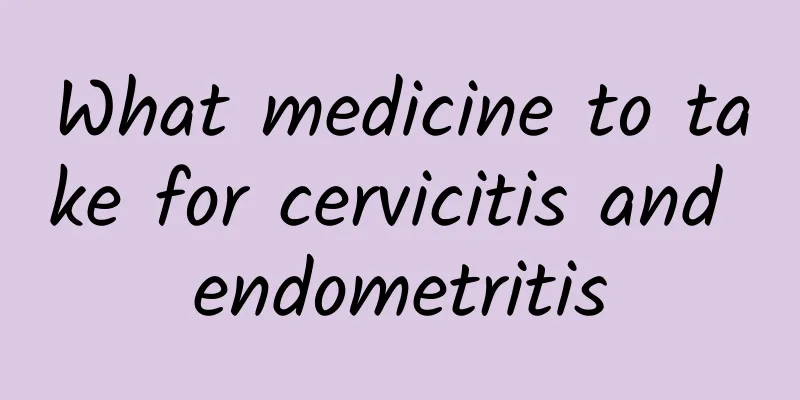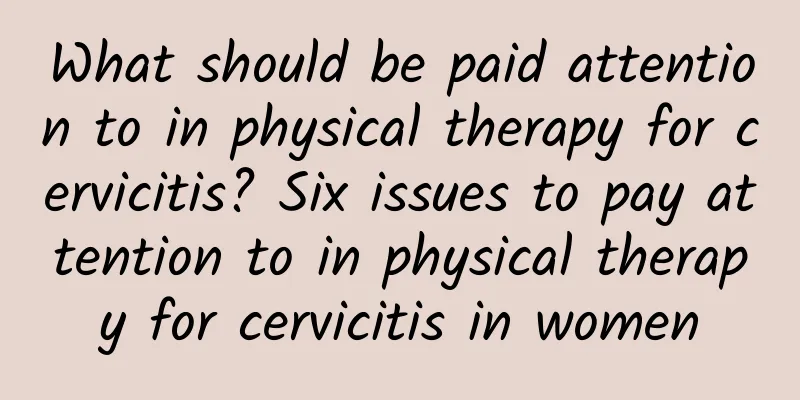What medicine to take for cervicitis and endometritis

|
Treatments for cervicitis and endometritis include antibiotics, anti-inflammatory drugs and immunomodulators, and the specific medication should be selected according to the cause and condition. Cervicitis and endometritis are usually caused by bacterial infections, and medication is required to control the infection, relieve symptoms and prevent complications. Common treatments include antibiotics such as cephalosporins, azithromycin, metronidazole, and anti-inflammatory drugs such as ibuprofen. At the same time, dietary conditioning and lifestyle improvements can also help recovery. 1. Drug treatment Antibiotics are the main drugs for treating cervicitis and endometritis. Cephalosporin antibiotics such as cefixime and ceftriaxone are effective against a variety of bacteria and are suitable for moderate to severe infections. Azithromycin is a broad-spectrum antibiotic commonly used to treat mycoplasma and chlamydia infections. Metronidazole has a better effect on anaerobic infections. For pain caused by inflammation, non-steroidal anti-inflammatory drugs such as ibuprofen can be taken to relieve symptoms. Immunomodulators such as pidotimod can help enhance immunity and promote recovery. 2. Diet adjustment Diet can help with the recovery of cervicitis and endometritis. Eating foods rich in vitamin C, such as oranges, lemons, and kiwis, can help boost immunity. Increasing dietary fiber intake, such as whole grains, vegetables, and fruits, can promote intestinal health and reduce inflammation. Avoid spicy, greasy, and irritating foods to avoid aggravating symptoms. 3. Improve your lifestyle Good living habits can help prevent and treat cervicitis and endometritis. Maintain personal hygiene, especially during menstruation, and avoid using irritating lotions. Avoid overwork and stress, and get enough sleep. Appropriate exercise such as yoga and walking can enhance physical fitness, but avoid strenuous exercise. The treatment of cervicitis and endometritis requires a combination of medication, diet and lifestyle. Rational medication under the guidance of a doctor, while paying attention to diet conditioning and improving lifestyle habits, can effectively control the disease and promote recovery. If symptoms persist or worsen, seek medical attention in a timely manner to avoid delaying treatment. |
<<: Cervical precancerous lesions leading to cervical hypertrophy
>>: Is endometriosis difficult to treat?
Recommend
How many days of rest are needed after painless abortion surgery?
Painless abortion surgery generally requires 7 to...
What are the common treatments for ectopic pregnancy?
The treatment of ectopic pregnancy generally requ...
What are the symptoms of acute cervical warts
The incidence of cervical warts is very high nowa...
Why do little girls get ovarian cysts?
Ovarian cysts in little girls may be caused by en...
What are the main causes of adnexitis?
Adnexitis is a very common disease. As a patient,...
Eating enzymes, capsaicin, and lignin can burn fat faster!
Why does obesity continue to haunt us? Many peopl...
Will drinking too much water cause edema? Chinese medicine doctor: People who want to lose weight should seize 6 opportunities to replenish water correctly
As the saying goes, "A man can go without fo...
How to treat Bartholinitis for better health
The dialectical treatment of Bartholinitis with T...
No pain from exercise! Experts teach 3 exercises to prevent discomfort
As the trend of health care becomes more popular ...
What should we pay attention to in the prevention of pelvic inflammatory disease?
Pelvic inflammatory disease is also one of the gy...
What are the dangers of cervical warts?
What are the dangers of suffering from cervical w...
How long can I breastfeed after a miscarriage during lactation? Learn more about it early
After abortion during lactation, you should adjus...
Do patients with uterine fibroids need to have their uterus removed? How should patients with uterine fibroids be treated?
After a clear diagnosis of uterine fibroids, whic...
Is it dangerous to have an ectopic pregnancy?
Ectopic pregnancy is also called ectopic pregnanc...
What color is menstruation during pregnancy? How to treat menstruation during pregnancy?
What color is menstrual period during pregnancy? ...









